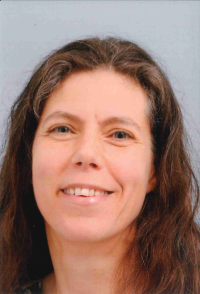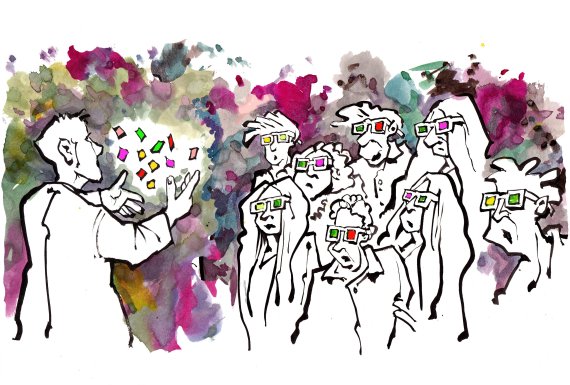illustration Henk van Ruitenbeek

Rik Leemans
Professor of Environmental Systems Analysis, involved in one massive online open course (MOOC)
‘You shouldn’t avoid controversy and you really don’t have to give every nuance. For example, I won’t be giving climate sceptics a voice in my lectures except to show how issues are framed. A lecture should be about the facts, even if people might question those. The content of a MOOC should be comparable to that of an ordinary lecture. After all, the participants should be acquiring the same knowledge and skills. To do that, a lecture should have a scientific balance. You need to give good insight into the material and to critically explore the methods. The format, though, can be different for offline and online lectures. In a lecture room, you can see from people’s faces whether they’ve understood. You don’t have that in MOOCs so you need a different approach in your lectures.’

Robert Schuwer
Lector in Open Educational Resources and MOOC expert, Fontys Hogescholen
‘There can be controversial topics in online lectures as well, but of course you need solid supporting arguments. If that is not the case, there is a design fault in the lecture. That is really no different online to offline. I don’t accept the argument that the viewers in a MOOC can’t respond immediately and you therefore need more nuance in an online lecture. The audience might not say anything in an ordinary lecture either. As a lecturer you have to deal with that too. Anyway, you can still give students an opportunity to respond in a MOOC, for example by setting up a forum, letting students write an essay or holding a webinar. The MOOC system WUR uses – EdX – offers such options. I don’t see that the public nature of MOOCs makes any difference. Students may already be making recordings of lectures that may equally become public. Do you want to ban that? Of course it depends what you are trying to achieve. If you see a MOOC as a marketing instrument, it may be useful to avoid controversies. But I don’t think a university should set out to avoid controversy.’
Ulrike Wild
Programme director of Online & Open Learning
‘The Van der Valk case resulted in a lot of fuss and trouble. I don’t feel any great need to comment on it in detail. In general, our MOOCs are extremely well set up in every respect. As the name suggests, MOOCs are open to a global audience. But there is no direct interaction of the kind you get in a lecture hall and you need to be aware of that. You probably express things a little differently in the pub compared to Facebook. I can’t immediately explain how to present controversial topics in a MOOC. We have MOOCs on a variety of themes and there are numerous ways in which you can approach a subject, even a controversial one. I do think it is important to consider beforehand which items could be controversial. That lets you take this into account more.’

Marrit van den Berg
Associate professor of Development Economics
‘A MOOC should be very to the point because you’ve only got a couple of minutes for a lecture. As a result, MOOCs are likely to be less rather than more nuanced. For the lecturer, the challenge is to still cover all the aspects in such a video lecture. I have only worked on one MOOC so far so I don’t yet have that much experience. I have never personally generated controversy in any of my lectures but I mostly teach methods and techniques. There are heated discussions in my discipline, for example about whether agriculture in Africa should become more large-scale in view of the need for food security. I sometimes make a provocative statement to encourage debate but then I try to make sure that all the different viewpoints are aired. It helps that I don’t have such a strong opinion on this subject myself. That makes it easier for me to be even-handed regarding the different parties.’

Simon Vink
WUR spokesperson, gave the comment on behalf of WUR
‘The discussion was mainly about a number of facts and less about bias in the presentation of the case. WUR’s MOOCs can definitely be controversial, but the message and nuances should be presented properly. In an ordinary lecture, you can play devil’s advocate about an issue to get a reaction and then use that as a teacher. In a MOOC, you don’t have that direct interaction with the students so you can’t use that instrument in the same way. But that is offset by other benefits. An online lecture is simply a different creature. Just like a comic book is a different creature to an ordinary book. So online lectures don’t necessarily have to have more nuance but you do have to approach them differently.’
Judith Groen
Second-year Nutrition and Health student, has taken one MOOC so far
‘In the first year I did two modules with a MOOC, always in combination with ordinary lessons. MOOCs are very useful for “dry” subjects because it’s easy to replay them. But if you only get those kinds of lectures, after a while you stop absorbing what is being said. So you shouldn’t have too many MOOCs in a single term. Controversial topics are better suited to an ordinary lecture. Then you can discuss it at once with the lecturer and one another. That works much better.’
Also read:
Professor: ‘Inaccuracies in controversial online lecture’
Row about removal of lecture resolved

